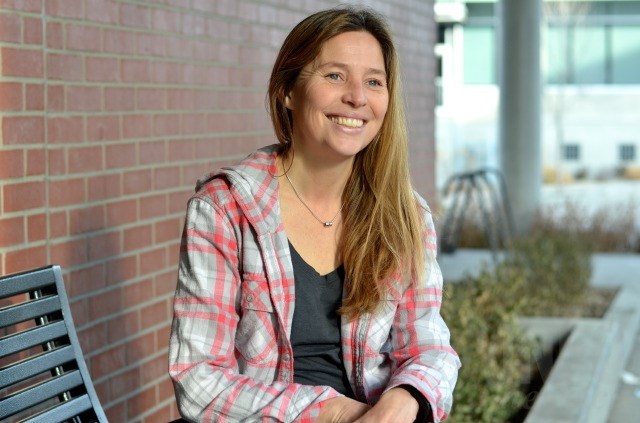
Rana Grace, the school district's secondary behaviour specialist, believes punishment is not the answer for at-risk youth who are acting out.
(CHARLOTTE HELSTON / iNFOnews.ca)
February 22, 2017 - 8:00 PM
“IT’S NOT ABOUT WHAT THEY WERE SUSPENDED FOR, IT’S THE STORY UNDERNEATH”
VERNON - It used to be that if you got suspended from school, it meant you were kicked out.
But that old-school approach is now taking a back seat to a new strategy being used in Vernon.
“Rather than being punitive, it became about working with these kids to find out what’s going on in their lives,” School District 22’s secondary behaviour specialist Rana Grace says.
Instead of being ‘sent home’ (youth often just hang out with other kids who are skipping class) students are now referred to the New Practices Program which helps at-risk youth by fostering connections instead of isolation. The program launched a year-and-a-half ago at the Vernon School District’s five high schools.
Students partake in a variety of community work through the program, including volunteering at the Upper Room Mission, Salvation Army, Schubert Centre and working at Davison Orchards. They’ve also gone hiking and spent time making things at the Vernon Community Arts Centre. It might sound like a reward for bad behaviour, but Grace says it’s all part of helping kids in the long run.
“I don’t think punishment is the answer. These kids are hurting inside. We have to find out what it is they need,” she says. “We have to ask ourselves ‘what is the end goal?’ We want them to not behave that way, to make better choices. That doesn’t always come from punishment.”
In addition to working with kids who are suspended, the program also tries to identify students who might be headed in that direction. School staff keep a close eye on kids who stop showing up to class, and refer them to the program.
“We do a lot of finding kids,” Grace says. “People will say ‘there was this kid on the street, they don’t go anywhere, we don’t know where they belong.’ So we’ll try to connect with them and attach them back to a school.”
Some students are identified when staff are following up on a kid who is not consistently attending class.
“They’re often with a bunch of other kids who aren’t in school,” she says.
Drop-out rates are falling across the country, but schools are still losing kids. In B.C., the percentage of kids who dropped out over a three-year period between 2007 and 2010 was 6.2 per cent, according to Statistics Canada.
“I believe our overall goal is to be raising and developing contributing members of our society. The more kids we can bring through our system the better,” Grace says.
She says students who get suspended or skip class aren’t ‘bad kids’ — there’s usually more going on. It could be related to a number of things, including mental health.
“Last year we had a girl in Grade 12. Her anxiety was so much she wasn’t coming to school. We did a lot of work with her, she did a lot of work, and she ended up graduating,” Grace says.
Every student is different, and supporting them can take many forms, from simply driving them to school to connecting them with mental health services.
“It’s not about what they were suspended for, it’s the story underneath,” Grace says.
Volunteering in the community is a key component of the program, and literally replaces the time kids would have spent ‘floating’ on suspension with constructive learning. Take a student who was suspended for doing drugs, for example. If that student is suspended in the traditional way, he or she may simply spend the time doing the very things that got them kicked out. Instead, they are now giving back to society, building confidence, and gaining perspective on the choices they make.
“I think we all feel better when we’ve helped someone, and done some piece of kindness. That builds self-esteem. It gives us a purpose,” she says of the volunteer work.
Some kids have even taken the initiative of returning to places like the Upper Room Mission to volunteer on their own time.
“They love it and want to continue,” Grace says.
The program is also looking to enhance relationships with local employers to give at-risk youth work experience and skills training.
Grace estimates 150 students connected with the program in 2016.
To contact a reporter for this story, email Charlotte Helston or call 250-309-5230 or email the editor. You can also submit photos, videos or news tips to the newsroom and be entered to win a monthly prize draw.
We welcome your comments and opinions on our stories but play nice. We won't censor or delete comments unless they contain off-topic statements or links, unnecessary vulgarity, false facts, spam or obviously fake profiles. If you have any concerns about what you see in comments, email the editor in the link above.
News from © iNFOnews, 2017